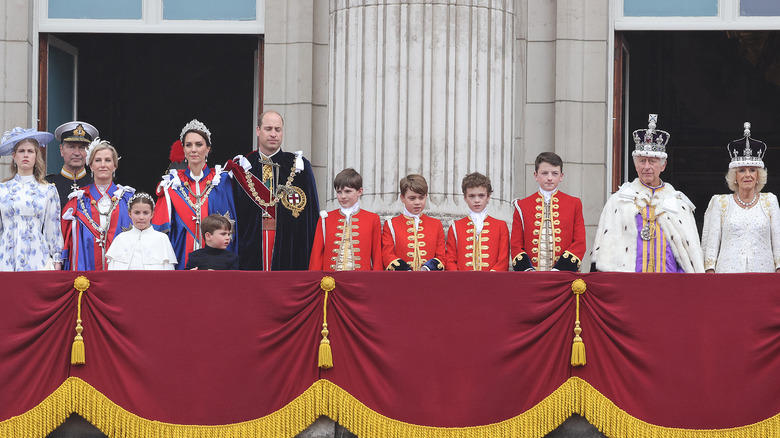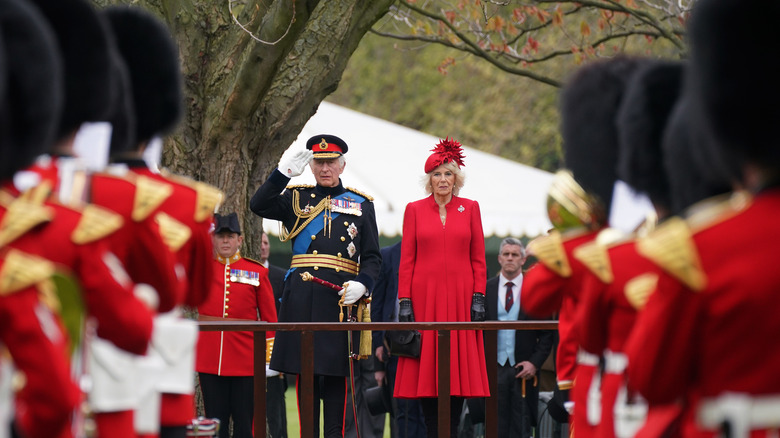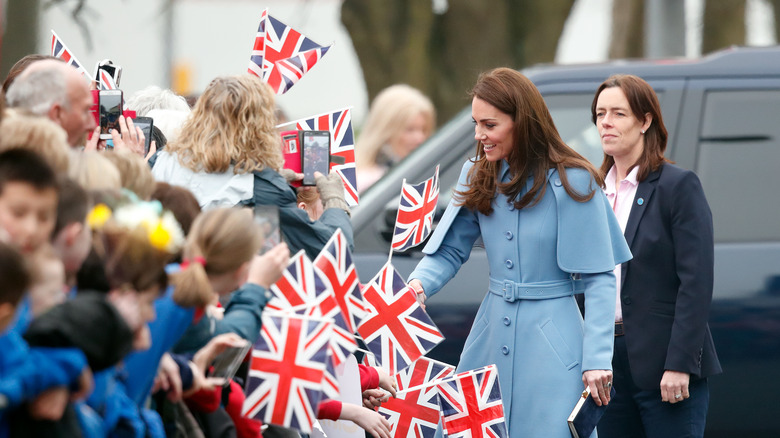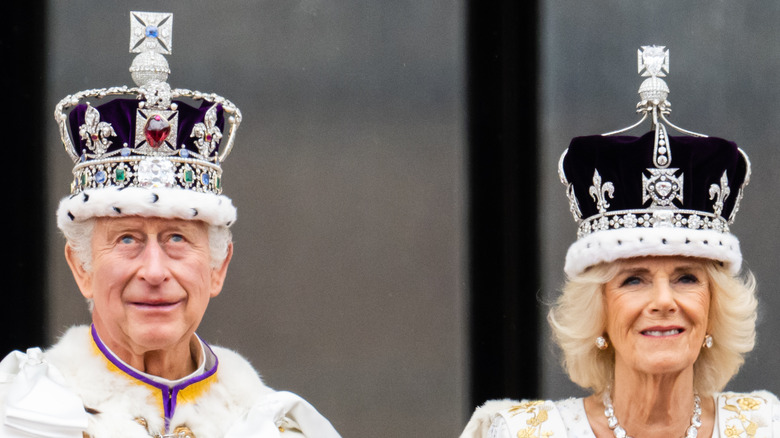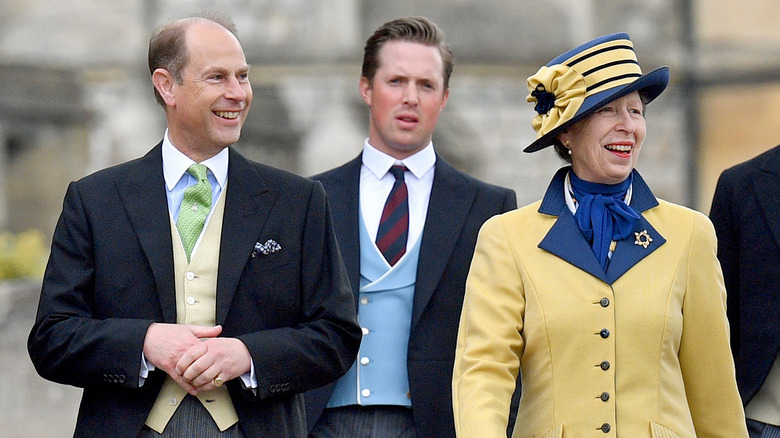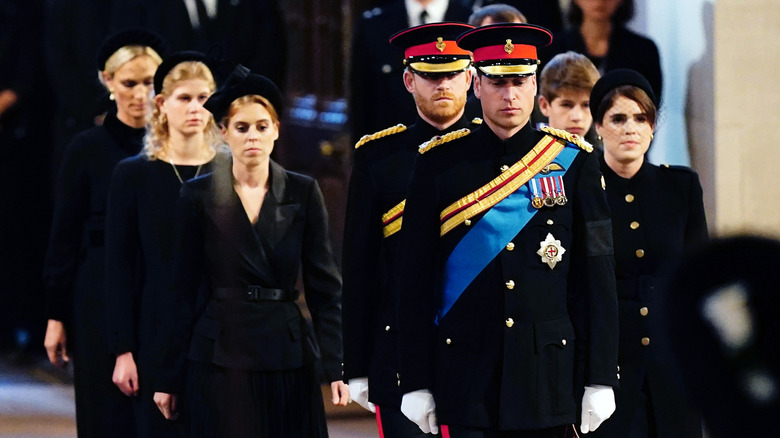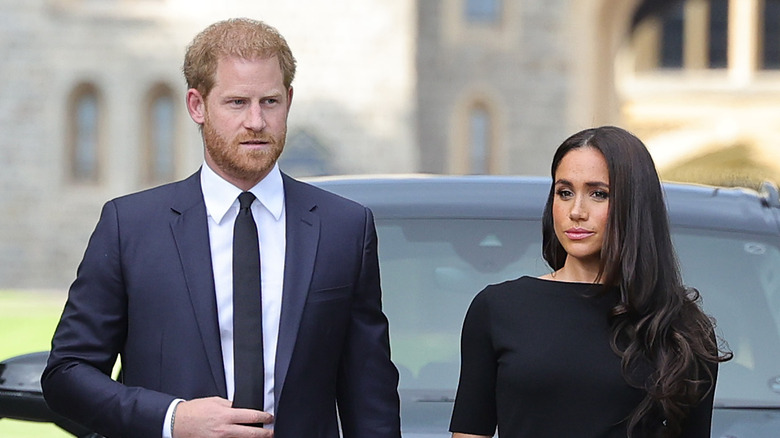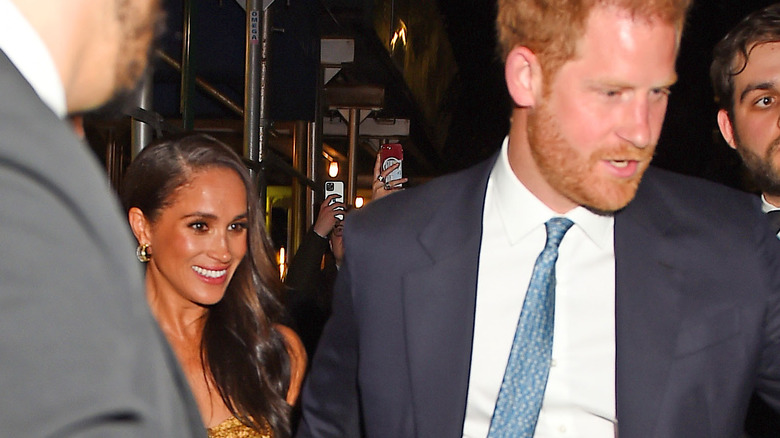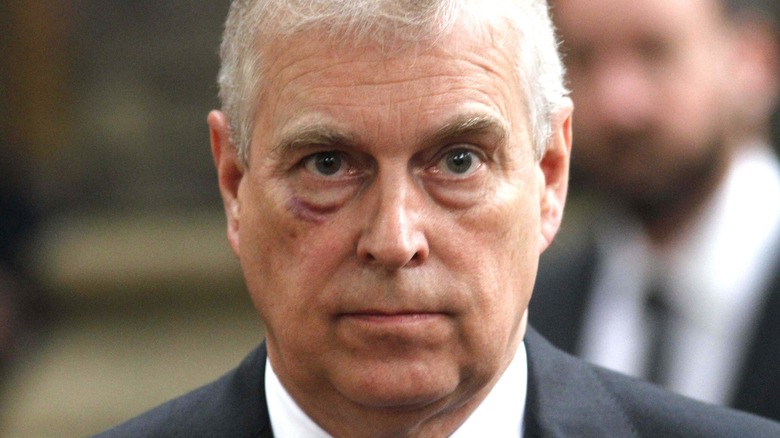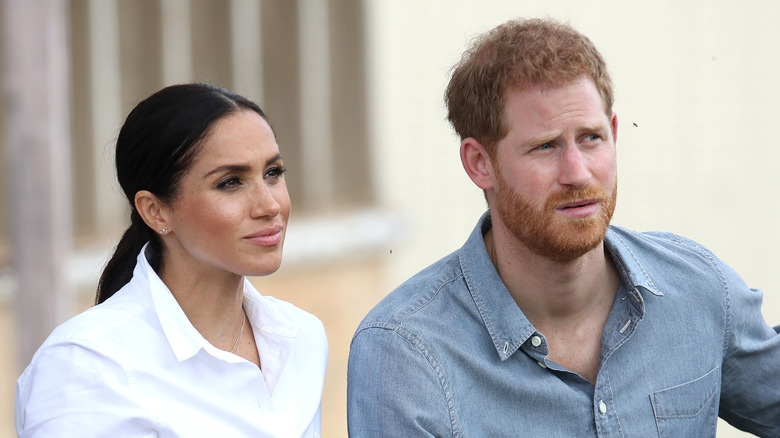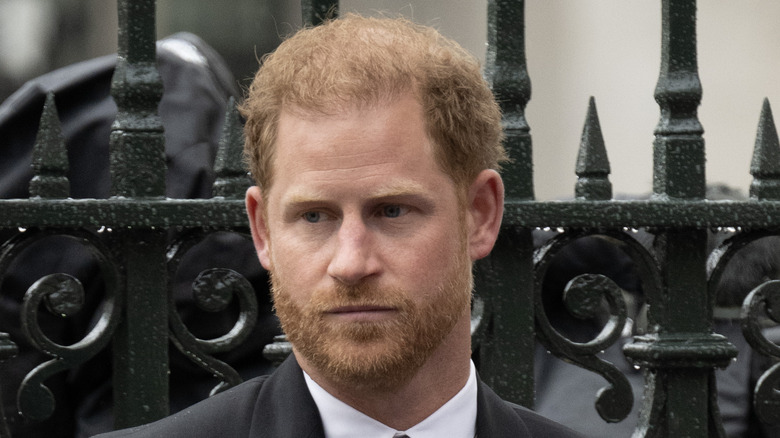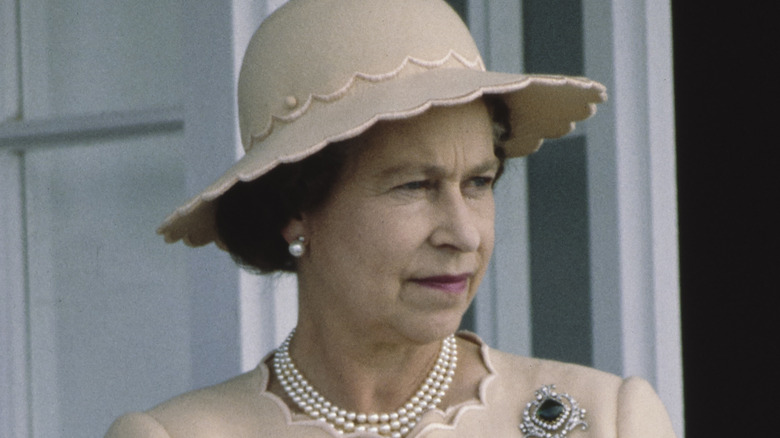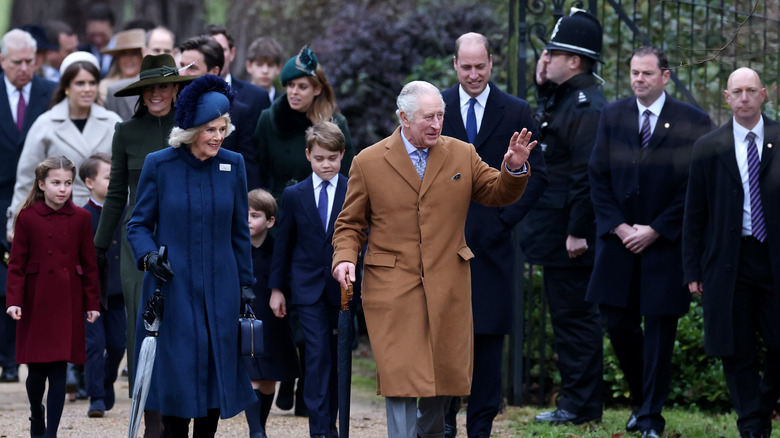Royal Family Security: Which Royals Get It And How Does It Work
The British royal family's security has been vehemently discussed ever since Prince Harry and Meghan Markle's revelatory interview with Oprah in March 2021. A major point of contention in the couple's fallout with the firm was the removal of their security detail upon leaving the U.K. and relocating to Canada (and eventually the United States). The Duke of Sussex described the decision as one he never fathomed would happen as a high-ranking descendant of the throne, but it's one the royal family has fervently stood by in the years since.
So, which royals do qualify for protection, who provides such protection, and how is it paid for? Many members of the royal family are guarded by 24-hour security, but several high-profile royals are not. And, to complicate matters further, some royals are only protected during specific scenarios (e.g., working events, weddings, and travel abroad), while others receive no protection at all.
Let's break down all the nuances of the royal family's security, from King Charles III down the Windsor line.
What about the guards in the red uniforms and bearskin hats?
If you're wondering about the iconic guards in the red uniforms and bearskin hats, you're thinking of the Royal Guard. Part of the Household Division of the British Army, the legion is tasked with the "unique responsibility for delivering state ceremonial and public duties, primarily in London and Windsor."
State ceremonial events include Trooping the Colour, the State Opening of Parliament, and other "events of national importance," whereas the most recognizable public guard duties include being stationed at Buckingham Palace, the Tower of London, and Windsor Castle.
Additionally, the Honorable Corps of Gentlemen at Arms protect the monarch during official ceremonial events including the State Opening of Parliament. Created by King Henry VIII in 1509, the Gentlemen at Arms wear the 1840s uniform of a Heavy Dragoon Guards officer, which includes a skirted red coat and a gold helmet featuring long white swan feather plumes. While they were last required for royal battle in 1649, members still carry a battle ax during duty today.
Who protects the royal family — and who pays for it?
An organization called the Executive Committee for the Protection of Royalty and Public Figures (known as RAVEC) determines which royals receive security, and the Metropolitan Police Service's (MPS) SO14 Royalty Protection Group is charged with keeping the royal family and its residences safe. Within the SO14, there are several subgroups: Personal and Close Protection, Residential Protection, and the Special Escort Group (SEG).
The Personal and Close Protection sector is comprised of Personal Protection Officers (PPOs). These armed and highly trained individuals protect members of the royal family while they're in the U.K. and when they travel internationally. PPOs are not uniformed officers; they instead dress similarly to United States Secret Service agents in what's considered plain clothes. The Residential Protection group is tasked with securing and guarding royal residencies, which includes any palace, castle, or house inhabited by the family. Unlike PPOs, officers within this sector do wear uniforms. Lastly, the SEG is a unit of armed officers who protect the royal family while they're in transit. The most common scenario in which the SEG is needed is when a royal is traveling via motorcade.
The MPS is funded with money collected from British taxpayers by the U.K. government's treasury. Information on how much it costs to provide the royal family security is kept private, "as disclosure of such information could compromise the integrity of these arrangements and affect the security of the individuals protected," according to GOV.UK.
Royals who receive publicly funded security
There are no concrete qualifications required for a royal to receive publicly funded security, as such matters are not publicly discussed, but Harry and Meghan's plight seems to have revealed conditions that (unofficially) must be met. Firstly, a royal title is warranted, according to the couple. This stipulation arose during the Sussexes' interview with Oprah Winfrey, as the duchess explained senior members of the family wanted to deny their son Archie the title of prince, which would disqualify him from receiving security (via YouTube).
This was a departure from King George V's 1917 precedent, which was updated by Queen Elizabeth II in 2012. The protocol originally proclaimed, "The grandchildren of any such sovereign in the direct male line (save only the eldest living son of the eldest son of the Prince of Wales) shall have and enjoy in all occasions the style and title enjoyed by the children of dukes of these our realms." The queen modified the decree to include all children in the direct line, regardless of gender.
As Harry and Meghan touched on in their 2021 interview, working members of the royal family — those who carry out duties on behalf of the monarchy without earning an income of their own — also appear to be entitled to publicly funded security. Royals who qualify under such conditions include King Charles and Camilla, queen consort, as well as Prince William and Princess Catherine and their children, Prince George, Princess Charlotte, and Prince Louis.
Family members who are afforded situational security
While King Charles' siblings Princess Anne and Prince Edward both have royal titles and are working members of the family, their taxpayer-funded protection is not provided on a full-time basis. The two senior royals are covered by security when they attend functions as working syndicates, but they don't require 24-hour protection like the highest-ranking members of the family.
A noteworthy exception for state-funded security is that of special circumstances. The palace will occasionally extend security to royals who don't usually qualify during major events, including royal weddings. For example, when Prince Edward married Sophie, taxpayers provided funds to outfit the royal wedding with security. The same occurred during the weddings of Prince William, Prince Harry, Princess Beatrice, and Princess Eugenie, among others.
Another deviation by the palace occurred when Beatrice studied abroad in Switzerland. For the duration of her education, the palace also used taxpayer dollars to provide her with protection.
Members of the Windsor family who are not afforded taxpayer-funded security in any capacity
Typically, non-working royals do not receive state-funded security. Princess Anne's children, Zara Tindall and Peter Phillips, were never bestowed with royal titles per Anne's wishes, and they do not work for the crown, so they aren't granted MPS protection. While Prince Edward's children, Lady Louise and James, Viscount Severn, do have royal titles, it's unlikely that they've ever received taxpayer-funded security, as their father is only granted such protection while carrying out official duties for the palace.
Additionally, their mother, Sophie, Duchess of Edinburgh (previously Countess of Wessex), told The Times of London that she and her husband have raised their kids "with the understanding they are very likely to have to work for a living." As they will therefore presumably never work for the monarchy, they're unlikely to qualify for security on that front as well.
Prince Andrew's daughters, Princesses Beatrice and Eugenie, reportedly received publicly funded security before 2011, when they were stripped of such protection. As both women have full-time careers outside of the monarchy, it can be deduced that they no longer qualify for MPS guards, according to Express.
Prince Harry pays for his own security
During the Sussexes' interview with Oprah, Prince Harry spoke about being stripped of palace-supplied security after he and Meghan stepped away from their duties as working royals and moved to North America. He explained, "I never thought that I would have my security removed, because I was born into this position. ... Their justification was a change in status, to which I pushed back and said, 'Is there a change in threat or risk?'" (via Yahoo).
Royal commentator Victoria Arbiter explained to Vox that the palace has stood by its decision because the Sussexes no longer live in the U.K.; therefore, they're no longer eligible to receive a service funded by British taxpayers, regardless of RAVEC's recognition of a lack of change in threat or risk, as Harry inquired.
The Duke of Sussex had been outfitted with security his entire life before the 2020 change. In his memoir, "Spare" Harry recalled assuring Meghan that the family would not revoke their security. "Not in this climate of hate. Not after what happened to my mother. Also, not in the wake of my Uncle Andrew," the prince wrote, referencing the Jeffrey Epstein scandal with which Prince Andrew was allegedly involved. Harry divulged to Oprah, after regaining their footing once they settled in California, he was able to hire private protection for himself, Meghan, and their children with the estimated $13.8 million inheritance Princess Diana left him.
The staggering price Harry and Meghan pay for private security
So exactly how much of the nearly $14 million inheritance do the Sussexes spend on an annual basis for private security? According to Forbes, the couple is likely to be shelling out $2 to $3 million each year for 24/7 protection.
The exorbitant cost is speculated to cover all guards and equipment required to secure Harry and Meghan's Montecito home and 7.4-acre estate, as well as security teams that provide protection during public outings. These teams include bodyguards who research routes and locations ahead of any excursion, those who provide an escort to and from the outing (during both the vehicular commute and on foot on location), guards who act as decoys for paparazzi, and protection officers who watch social media to stay on top of any potential threats.
Some quick math makes it clear that Harry's inheritance from Princess Diana will dry up after a few years with the hefty multimillion price tag for private security. Conscious of their limited funds, Harry and Meghan's decision to sign a variety of media deals — Meghan's Spotify partnership for her "Archetypes" podcast, the couple's limited docuseries on Netflix, Prince Harry's "Spare" book deal — is a strategy to make their own income to support their expensive, albeit necessary, security needs.
Prince Andrew has private security paid for by the family
After Prince Andrew was demoted from his role as a working royal and stripped of his titles by Queen Elizabeth following the Epstein scandal, he was subjected to a review by RAVEC to determine whether he was still eligible for state-funded security, reported The Telegraph.
As he no longer met either of the seemingly required conditions based on the palace's reasoning for not outfitting the Sussexes with protection — in addition to being accused of sexual abuse — it came as a bit of a shock when the committee determined that the disgraced prince would be allowed to retain his MPS security. There are two key differences between Prince Harry and his uncle, though. Andrew is one of the late queen's children, and he's a resident of the U.K. These circumstances are presumably what qualified him for state-funded security despite his lack of title or official role.
However, the British public did not take kindly to footing the bill to protect an alleged abuser. A few months following the RAVEC review, The Telegraph reported King Charles is likely now funding his brother's private security — a courtesy the new monarch has notably not extended to his estranged son.
Prince Harry and Meghan Markle's Manhattan car chase made their security concerns indisputable
Upon leaving the May 2023 Women of Vision Awards in New York City, Prince Harry, Meghan Markle, and her mother, Doria Ragland, were involved in a "relentless" two-hour-long "near catastrophic car chase" with a horde of paparazzi, according to a spokesperson's statement given on behalf of the Sussexes (via CNN).
The New York Police Department confirmed the occurrence, and while the Sussexes alleged there were "multiple near collisions" throughout the pursuit, the NYPD made no arrests and said there were no collisions or injuries related to the chase.
Even in the absence of a catastrophic outcome, the incident has widely been compared to that of Princess Diana's fatal 1997 Paris car crash caused by photographers doggedly chasing her vehicle. Bodyguard Chris Sanchez told CNN, "I have never seen, experienced anything like this," further illustrating Harry and Meghan's need for vigilant security detail. While being public figures does warrant a unique amount of interest and attention, the couple's spokesperson asserted, "It should never come at the cost of anyone's safety." The royal family declined to comment on the occurrence.
Harry lost his bid to pay for his own police protection while in the U.K.
Despite ongoing breaches in security including the controversial car chase, Prince Harry still struggles at home. The prince offered to privately fund police protection for himself and his family following RAVEC's removal of his state-funded security when he and Meghan stepped down in 2020, but he was rejected. Harry challenged the ruling, but in May 2023, the High Court in London upheld its decision.
According to a statement given by a spokesperson for the Sussexes, the private security team hired by the couple in the U.S. "cannot replicate the necessary police protection needed whilst in the U.K. In the absence of such protection, Prince Harry and his family are unable to return to his home" (via People). Lawyers representing the Home Office argued wealthy individuals should not be allowed to "buy" police officers as private security guards. Despite Harry's wish "to ensure the safety of himself and his family while in the U.K. so his children can know his home country," the court's decision ultimately favors the government and cannot be appealed.
While he lost the bid to pay for personal police protection during visits to England, Harry has petitioned to have his state security reinstated, and he is still waiting for the High Court to come to a decision.
Situations that have previously required security to step in
There have been several incidents throughout the royal family's history that have required security to step in, including the 1982 Buckingham Palace break-in by Michael Fagan, which was portrayed in a Season 4 episode of "The Crown." Breaking into the palace twice over the course of several weeks, the decorator found the late monarch's bedroom during his second excursion and even briefly interacted with her before being detained by security.
According to a Scotland Yard report shared with The New York Times, Fagan entered through an unlocked window after penetrating the grounds and scaling a drainpipe on the main building. After entering the palace, Fagan found the queen's apartments, entered her bedroom, and opened her curtains. Waking to a stranger in her chambers, she pressed a bedside alarm to alert security of the intrusion, but because every person on duty was not at their stations, the alarm went unnoticed.
A few minutes after Fagan entered her bedroom, Queen Elizabeth used her bedside telephone to request police assistance. Six minutes after that call, she phoned again for help as no one had come to her aid. Finally, the queen was able to flag down a staff member, who helped her relocate Fagan to a nearby pantry. Shortly after, an officer arrived to remove the intruder from the premises. Suffice it to say that the palace tightened up its security protocols after the Fagan incident.
What it's actually like to protect the royal family, according to former bodyguards
Dancing with the queen, cracking jokes with Charles, aiding Harry and William with their brotherly shenanigans, catching sloppy kisses from baby George — these are some of the memories former Royal Protection Officer David Lombardi associates with the seven years he spent protecting the royal family.
As ordinary as these moments seem, the magnitude of his presence in the Windsor family's lives did not go unnoticed by Lombardi. He told Express in 2021 of the queen, "I couldn't stop thinking that this was the most famous woman in the world with a lineage going back 1,000 years and here I was passing the time of day with her. In all the time I worked as a Royal Protection Officer, I never got over that feeling." Lombardi added that even with their elevated position in global society, "The royals are really quite normal, very nice and down to earth."
Simon Morgan, a former royal PPO of six years, spoke to Insider in 2019 about the more tactical components of protecting the royal family. "The actual threat is constant and you have to factor in different things according to the principal," he explained. "Bodyguarding is a thought process, and you have to have that thought process." Morgan added, "It's not about fighting, driving, shooting, or looking good in sunglasses. There's so much more to it than that."
